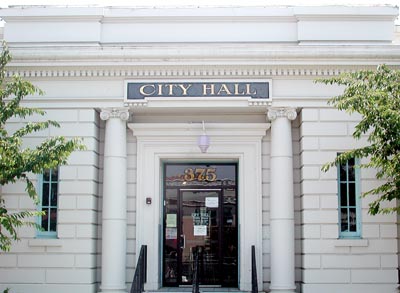The police officers union from the outset of negotiations last
fall expressed its discontent with the idea of cutting members’ pay
by 5 percent while adding two more officers to the department. The
union’s concern is the possibility of layoffs down the line, and
having to eliminate those officers soon after their arrival, a
representative said.
In their first meeting last fall over pay-cut negotiations, city administrators and the police officers union hit a roadblock that played a big role in the now six-month delay to an agreement.
Union leaders say they were willing to accept the 5 percent pay cut that all other city employees absorbed starting in November in light of annual deficits for eight years running that would drain the once-flush general-fund reserve by 2012. Officials estimated those reductions should save the city about $570,000 this fiscal year toward efforts to close a $1.6 million deficit.
Most other workers chose to use furlough days, but it wasn’t much of an option for police due to scheduling and safety concerns.
As talks got going with the police union, though, the city also had broached its intention to hire two additional officers in continuing on with plans for public safety enhancement related to the Measure T sales-tax hike, which voters approved in November 2007.
The police officers union from the outset expressed its discontent with the idea of cutting members’ pay by 5 percent while adding two more officers to the department. The union’s concern is the possibility of layoffs down the line, and having to eliminate those officers soon after their arrival, a representative said.
City Manager Clint Quilter, who’s handling talks for the council, responded last week by contending it is inappropriate to include staffing considerations as part of collective bargaining and he noted he did not want to “negotiate in the press.”
A week before that, the city manager in a brief interview said the two sides were close to an agreement but there were “language” issues to resolve. When asked, Quilter indicated that one of the matters holding up an approval was whether to make the cuts retroactive to November.
Union leadership last week in response disagreed with Quilter’s portrayal of the negotiations and pointed out how the hiring matter was a primary factor in the delay.
Hollister police Sgt. Ray Wood has been the longtime union president but in recent months stepped aside from the role because he’s running for sheriff in the June primary. He recalled how the union had expected an agreement in December but it got “pushed off and pushed off and pushed off.”
When the union disagreed with the hiring of two new employees, Wood said Quilter responded in negotiations by noting how the city then would have to lay off an officer to help reach the 5 percent drop in compensation for the department.
Wood called that “strong-arm tactics.”
Quilter said the prospective hiring of two additional officers “doesn’t really have anything to do with it.”
“Cities don’t want to put staffing stuff in collective bargaining agreements,” Quilter said.
As of today, the department has 27 full-time sworn officers. It also has four animal control officers and six clerical employees. The sworn officers and clerical staff are included in the police union, while the animal shelter workers are in another bargaining group.
Quilter said the city and union negotiator are “awfully close to getting (the deal) done.” There is an incentive to have it signed before June because the police union has elected to take its 5 percent cut by giving back two checks a year that officers traditionally receive as lump sums for holiday pay. It’s a system the union set up many years back, withholding additional funds for work done on holidays, so officers had some extra money during the summer and at the end of the year.
Sgt. David Westrick, who is handling some of the union president duties in Wood’s absence from the position, also stressed how members understand they have to take the 5 percent reduction. He noted how Quilter has been working “diligently” on the negotiations to get it finished.
“Members agree. We’ve got to get the contract done,” he said.
Westrick pointed out the union’s particular concern about the city’s distressed finances and the prospects for lost jobs down the road. He questioned hiring two people and having them trained, only to potentially have their jobs eliminated.
“We thought, in the future this might be a thing where they’re going to get laid off,” he said.
Westrick said the retroactive nature of the cuts is “really not an issue for us.”
When told of the union’s perspective on the retroactive nature of the reductions, Quilter had this to say: “Making it equitable with everyone is in the city’s interest.”










